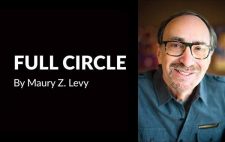At our house, Christmas was the time to watch other people be happy. People with twinkling lights and tinseled trees and Betsy Wetsy dolls dressed as Jesus.
Ours was one of three houses on the block that had no color at Christmas. No color, no cards, no eggnog. All three houses were together, owned by three Jewish wage earners who worked at the same toy store on Market Street. Some of the neighbors would call our dark patch of the block “Little Israel.” But not to our faces.
The closest we came to celebrating Christmas was through a family a few doors down. It was a house that had lights all year ’round – the blue and red lights of police cars that would come from the Levick Street station to break up the fights of the couple who lived there.
The fights were loud and frequent. They usually started when the man, who drove a truck for Frank’s sodas, had a few drinks that were stronger than black cherry wishniak.
In the summer, when only a tattered screen door separated them from the still of the night, you could hear the man yelling the loudest. Sometimes it was because his dinner was cold. Sometimes it was because his sports section was missing. It was always something.
The woman didn’t yell much. Hers was more of a “please don’t hit me” wail, somewhere between a scream and a cry.
When the cop cars showed up, they would usually take the man out of the house first. His neck was red, almost as red as his nose. And his hair looked like it hadn’t been combed in a week. He always wore one of those sleeveless white undershirts that people would later call wife-beaters.
In the bitter cold that was December, we hardly saw them. We just heard them. Until the day we heard the sirens instead.
The man had finally gone too far and the cops would take him far away, to Holmesburg Prison. The wife just stood on the sidewalk, holding her little boy and crying, as the blood dripped down from the cut over her eye, down to the torn cotton housedress that she could never wear again.
“I’m glad they finally took that SOB away,” my mother would tell my father. But it’s not going to be a very nice Christmas for the little boy.”
The little boy’s name was Joseph. He was a cute little boy with long blond hair and big blue eyes. And now he had no father. And no money. Men who drove trucks for soda companies didn’t have pension plans or money in the bank.
“We should help them,” my mother said. She was always helping somebody. My parents didn’t have any extra money laying around, so they did what they did best. My mother baked. Lots and lots of cookies with jimmies on the top. And a giant triple-layer chocolate cake that could feed a family for a month.
And every night, my father would stash a little toy or two in his coat pocket before he left the store. A little racecar, a bag of marbles, a shiny new sponge ball.
The night before Christmas, they wrapped all the toys with the Sunday funnies they saved in the basement. My mother put layers of tin foil over the plates that carried the cookies and cake. And a little red bow on top of the foil. Then they put on their coats, turned up their collars and walked a few houses down.
The woman answered the doorbell. She didn’t even know my parents’ names. That was all right. She invited them in. They declined. Knowing that she couldn’t offer them anything, they didn’t want to embarrass her. They just left the gifts behind.
“Merry Christmas,” my mother said.
“God bless you,” the woman said. “God bless you both.”
The little boy appeared behind her, with feet on his pajamas and sleep in his eyes.
“Who was it, Mommy?” he asked.
“Angels, honey,” she told him. “It was angels.”












